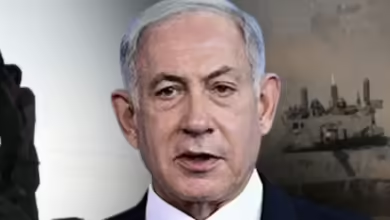Senior officials want G7 unanimity on the Israel-Hamas conflict, blinking
During intensive talks in Tokyo on Wednesday, the Group of Seven major industrial democracies sought to unite their positions on the Israel-Hamas conflict. US Secretary of State Antony Blinken and other top diplomats sought to contain the escalating humanitarian crisis and prevent the fighting from spreading to other parts of the Middle East.
Global issues collide with the G7 Foreign Ministers’ second and last day of discussions. While the main topics of discussion are the horrific month-long conflict in Gaza and the humanitarian suffering that has ensued since Israel responded to the deadly Hamas attack on October 7, the envoys are also discussing North Korea’s nuclear and missile programs, Russia’s war in Ukraine, and China’s increasing aggression in territorial disputes with its neighbors.
After a rapid trip of the Middle East, Blinken arrived in Tokyo and said that, like diplomats over Ukraine and other significant problems, it is imperative to have a united approach on the conflict in Israel. The ministers are also working to prevent the already-existing divisions in Gaza from becoming worse.
Shortly after meeting with Prime Minister Fumio Kishida on Tuesday, Blinken told Japanese Foreign Minister Yoko Kamikawa, “This is a very important moment as well for the G7 to come together in the face of this crisis and to speak, as we do, with one clear voice.”
Together with preserving current views on other issues, Blinken and the foreign ministers of Britain, Canada, France, Germany, Japan, and Italy will be attempting to find common ground in Tokyo, partly to stop the Gaza conflict from further upsetting already precarious security in the larger Middle East.
As at least four of the G7 members made declarations in support of a firm collective approach, it seemed like an early agreement on Gaza was emerging. US officials said that after the discussions on Wednesday, they anticipated the group to issue a statement outlining a shared stance.
Kishida remarked The prime minister “highly appreciates the leadership and diplomatic efforts by the Biden administration concerning this issue,” his office said in a statement. “The unity of the G7 is needed more than ever with the situation in Israel and Palestine, the situation in Ukraine, and the challenges in the Indo-Pacific region.”
“You have our complete backing,” Kamikawa informed Blinken.
“As G7 countries, we are making clear that Israel has the right and the duty to protect its population and its people in the framework of international law,” said German Foreign Minister Annalena Baerbock. “How we can finally get humanitarian cease-fires off the ground, in terms of time and also geographically,” she remarked, referring to the several partners she has been in talks with.
James Cleverly, the foreign secretary of Britain, informed a small group of reporters, including The Associated Press, that his country does not favor a broader cease-fire, but rather a geographically limited “humanitarian pause.”
He said that a cease-fire would make it more difficult for Israel to protect itself. “First of all, we have seen and heard absolutely nothing that makes us believe that Hamas leadership is serious about (a) cease-fire,” he added.
Among Blinken’s initiatives are pushing for a large increase in the quantity of humanitarian aid going to Gaza, persuading Israel to agree to “pauses” in its military action so that aid can enter and more civilians can evacuate, starting the process of preparing the area for a post-conflict security and governance framework, and keeping the conflict from getting worse.
Blinken recognized the strong disagreements on the pause idea and called all of them “a work in progress.” The United States rejects the Arab and Muslim countries’ demands for a rapid, complete cease-fire, and Israel is not persuaded. Additionally, there has been opposition to talking about Gaza’s future, as the Arab governments maintain that the urgent humanitarian issue has to be resolved first.
Getting approval from the G7—none of which border or are directly engaged in the conflict—might prove to be a less intimidating task for Blinken.
However, there have been a few minor rifts over Gaza, which has stoked public opinion throughout the world. Democracies are not immune to strong emotions, as shown by the large-scale anti-Israel and pro-Palestinian protests that have taken place in G7 cities and other places.
France supported a resolution at the UN Security Council last month that called for a humanitarian ceasefire in Gaza, but the resolution was vetoed by the US because it did not go far enough in denouncing Hamas’ assault on Israel, which started the conflict. In that vote, Britain stayed silent.
A non-binding US-Canadian resolution that would have denounced Hamas failed few days later in the UN General Assembly, but a different resolution demanding an immediate cease-fire was overwhelmingly approved. France voted in support of the second resolution, but the US did not. Japan, Italy, Germany, Canada, and Britain all refrained.
The G7 remained united in support of the post-World War II international order even prior to Russia’s incursion into Ukraine. The organization has maintained a cohesive front in denouncing and opposing Russia’s conflict, despite some fracturing at the periphery.
In a similar vein, the group has united in its demands that China use its increasing international influence responsibly, that North Korea halt its nuclear weapons and ballistic missile programs, and that cooperative measures be taken to combat pandemics, synthetic opioids, and the dangers posed by the misuse of artificial intelligence.
After traveling via Israel, Jordan, the West Bank, Cyprus, and Iraq for four days, Blinken finally landed in Tokyo from Turkey. He would go to South Korea and then India from Japan.







